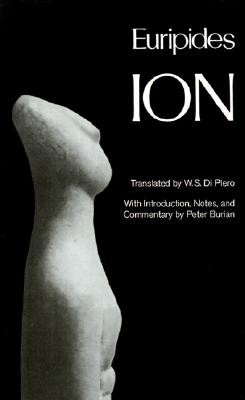| Ion Contributor(s): Euripides (Author), Di Piero, W. S. (Author), Burian, Peter (Editor) |
|
 |
ISBN: 0195094514 ISBN-13: 9780195094510 Publisher: Oxford University Press, USA OUR PRICE: $25.64 Product Type: Paperback - Other Formats Published: June 1996 Annotation: One of Euripides' late plays, Ion tells the story of Kreousa, queen of Athens, and her son by the god Apollo. Apollo raped Kreousa; she secretly abandoned their child, assuming thereafter that the god had allowed him to die. Ion, however, is saved to become a ward of Apollo's temple at Delphi. In the play, Kreousa and her husband Xouthos go to Delphi to seek a remedy for their childlessness; Apollo, speaking through his oracle, gives Ion to Xouthos as a son, enraging the apparently still childless Kreousa. Mother tries to kill son, son traps mother at an altar and is about to do her violence; just then, Apollo's priestess appears to reveal the birth tokens that permit Kreousa to recognize and embrace the child she thought she had lost forever. Ion must accept Apollo's duplicity along with his benevolence toward his son. Disturbing riptides of thought and feeling run just below the often shimmering surface of this masterpiece of Euripidean melodrama. Despite Ion's "happy ending", the concatenation of mistaken identities, failed intrigues, and misdirected violence enacts a gripping and serious drama. Euripides leaves the audience to come to terms with the shifting relations of god and mortals in his complex and equivocal interpretation of myth. |
| Additional Information |
| BISAC Categories: - Drama | Ancient & Classical - Literary Criticism | Ancient And Classical |
| Dewey: 882.01 |
| LCCN: 95034977 |
| Series: Greek Tragedy in New Translations (Paperback) |
| Physical Information: 0.25" H x 5.33" W x 7.99" (0.30 lbs) 112 pages |
| Themes: - Chronological Period - Ancient (To 499 A.D.) - Cultural Region - Greece |
| Descriptions, Reviews, Etc. |
| Publisher Description: Series Copy Based on the conviction that only translators who write poetry themselves can properly recreate the celebrated and timeless tragedies of Aeschylus, Sophocles, and Euripides, The Greek Tragedies in New Translations series offers new translations that go beyond the literal meaning of the Greek in order to evoke the poetry of the originals. Under the editorship of Herbert Golder and the late William Arrowsmith, each volume includes a critical introduction, commentary on the text, full stage directions, and a glossary of the mythical and geographical references in the plays. One of Euripides' late plays, Ion is a complex enactment of the changing relations between the human and divine orders and the way in which our understanding of the gods is mediated and re-visioned by myths. The story begins years before the play begins, with the rape of the mortal Kreousa, queen of Athens, by Apollo. Kreousa bears Apollos' child in secret then abandons it. Unbeknownst to her, Apollo has the child brought to his temple at Delphi to be reared by the priestess as ward of the shrine. Many years later, Kreousa, now married to the foreigner Xouthos but childless, comes to Delphi seeking prophecy about children. Apollo, however, speaking through the oracle, bestows the temple ward, Ion, on Xouthos as his child. Enraged, Kreousa conspires to kill as an interloper the very son she has despaired of finding. After mother and son both try to kill each other, the priestess reveals the birth tokens that permit Kreousa to recognize and embrace the child she thought was dead. Ion discovers the truth of his parentage and departs for Athens, as a mixed blood of humanity and divinity, to participate in the life of the polis. In Ion, disturbing riptides of thought and feeling run just below the often shimmering surfaces of Euripidean melodrama. Although the play contains some of Euripides' most beautiful lyrical writing, it quivers throughout with near disasters, poorly informed actions and misdirected intentions that almost result in catastrophe. Kreousa says at one point that good and evil do not mix, but Euripides' argument, and what the youthful Ion strives to understand, is that human beings are not only compounded of good and evil, but that the two are often the same thing differently experienced, differently understood, just as beauty and violence are mixed both in the gods and in the mortal world. |